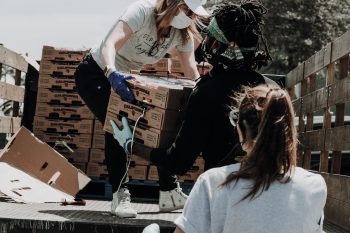Home / Health & Wellness Articles / Mental Health /
Homelessness in America and How Centerstone is Helping

People who are experiencing homelessness face many risks to their safety every day. Some of the biggest threats to their safety are extreme temperatures, inclement weather, theft, legal issues, and the spread of illness. Homelessness can often contribute to increased mental health challenges, many of which often go unaddressed. Examples of mental health challenges that homeless populations might frequently experience include PTSD, substance use disorder, depression, anxiety, bipolar disorder, and others. These affective disorders can make daily life challenging, especially when it comes to maintaining personal relationships, finding or maintaining employment, managing finances, and finding or living in stable housing.
Homelessness is not an issue one can battle alone. Here are just a few ways you can help your community:
- Research. Staying involved with what your community is doing to support your community members experiencing homelessness is really important. “You can incite change by staying informed about local politics and emailing your representatives,” says Phyllis Viltz, Director of Special Projects at Centerstone. Knowing the resources your community offers will be more beneficial in getting others involved.
- Volunteer. Ending homelessness is a community effort. Find local shelters and offer your services to help do your part. “Strengthening communities and doing your part to help by offering housing and jobs to those who are struggling. Advocate on behalf of your community members for landlords to accept vouchers and for employers to allow them to work,” says Viltz.
- Spread Awareness. “Talk to media and alert legislators about your community’s efforts and resources they provide to the homeless population. Many people don’t understand the various reasons people find themselves experiencing homelessness, nor are they aware of the barriers people face when climbing out of homelessness,” says Viltz. Spreading the word will likely go further than just your local community and invite others to participate in volunteer programs.
Centerstone offers a variety of different services and grant programs in support of our homeless populations, including:
- Centerstone offers an array of different housing services for many different situations. In 2021, a Centerstone facility opened in Bloomington, Indiana, called Kinser Flats. Kinser Flats are for individuals and families experiencing homelessness who also suffer from substance use disorders or co-occurring substance use and mental health disorders. Kinser Flats features 50 individual housing units with on-site services related to recovery from opioid and substance use disorders.
- Keys to Recovery is a program made possible by the U.S. Substance Abuse and Mental Health Services Administration (SAMHSA) to help those experiencing homelessness and those with a substance use disorder or co-occurring substance use and mental health disorders. Centerstone’s Keys to Recovery provides trauma-informed therapy and case management to help patients identify recovery goals and stable housing that supports recovery. Keys to Recovery also offers employment assistance, linkage and referral to physical and mental health care resources, and connections to transportation services, daycare, education, and other community resources.
If you or someone you know is struggling to maintain stable housing or is facing homelessness, Centerstone can help. Call us at 1-877-HOPE123 (1-877-467-3123) for more information about our housing services.


